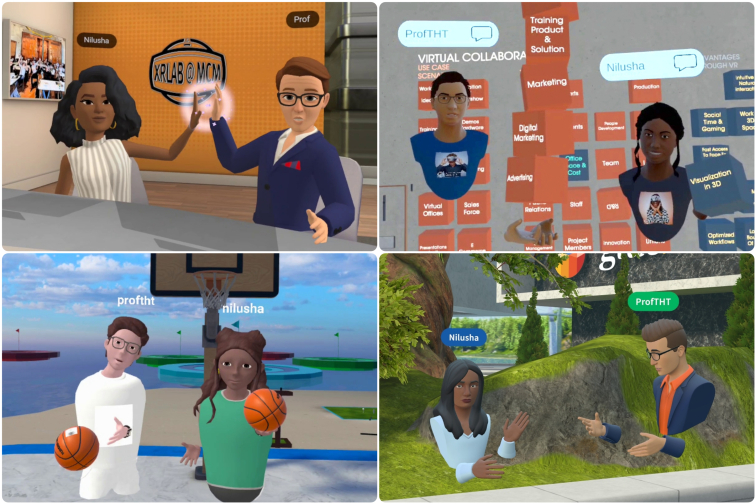Navigating the Enterprise Metaverse – New XRLab@MCM Article published in Business Horizons!

The rise of digitalization has brought remote meetings via Zoom, and the rise of virtualization has added the enterprise metaverse as another remote meeting format. When, and for whom, do meetings in the virtual spaces make more sense than assembling a team via Zoom or even physically? In their latest article “Navigating the Enterprise Metaverse: How Virtual Reality Affects Business Agility and Meeting Outcomes” which has just been accepted for publication in Business Horizons, Nilusha Aliman and Prof. Hennig-Thurau from the Chair of Marketing & Media at the MCM aim to answer this question – and provide those who are curious about specific, and evidence-based, guidance how metaverse meetings can be carried out in the most effective way. Business Horizons (Impact factor: 7.4) is not only a globally renowned journal, but one that is dedicated to bridge the gap between scholarly research and practical application.
In their new article, the authors build on two empirical studies that they have carried out at the eXperimental Reality Lab (XRLab@MCM) together with their practice partner (and co-author) André Henke from the Ministry of the Interior and Sport in Lower Saxony (Germany). Based on ‘real-world’ insights, they provide very specific and actionable insights for managers who are in charge of assembling meetings within their organization or between members of different firms. Specifically, they offer a six-step process to guide managers in their choice of the right meeting format – and teach them how to make the most out of meetings in the virtual environments of the enterprise metaverse (including a list of powerful metaverse meeting apps – such as those by RAUM, glue, Remio, and Arthur).
Key findings show that meetings in the enterprise metaverse offer significant benefits for enhancing business agility and improving key meeting outcomes. Managers who have participated in VR meetings reported experiencing higher levels of closeness and satisfaction compared to those who used traditional videoconferencing methods. This indicates that VR meetings can create a more engaging and fulfilling experience for participants. Further, enterprise metaverse meetings are particularly well-suited for agile work processes, as they foster team spirit and keep remote teams actively engaged. To ensure that the metaverse is the most effective environment for team gatherings and to avoid costly and productivity-decreasing mistakes, it can be helpful to follow the carefully designed six-step process that the authors offer in the article. By doing so, businesses can fully leverage the potential of VR meetings to boost collaboration and efficiency.
Learn more about the benefits of enterprise metaverse meetings and the six-step process for successful implementation in the pre-print of the full article (which is available OPEN ACCESS!):
https://www.sciencedirect.com/science/article/pii/S0007681324000673

